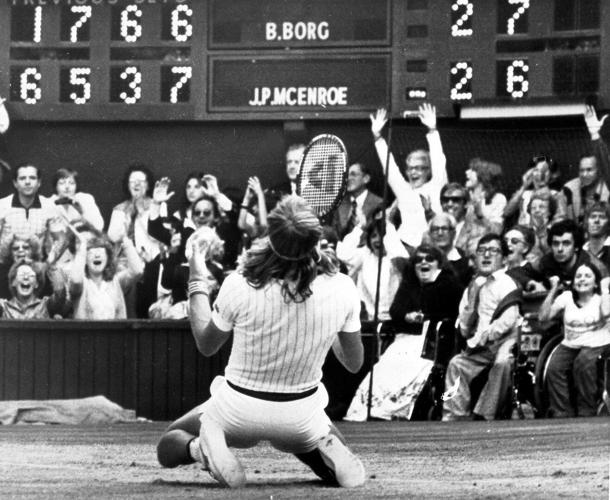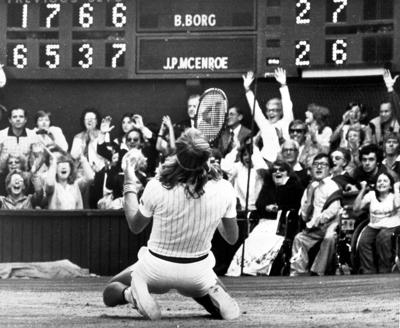Bj├Črn Borg starts his new memoir, ŌĆ£Heartbeats,ŌĆØ with a story about being rushed to a Dutch hospital in the 1990s after overdosing on ŌĆ£alcohol, drugs, pills ŌĆö my preferred ways of self-medication,ŌĆØ and the Swedish tennis great closes it by revealing that he was diagnosed with prostate cancer.
ŌĆ£ItŌĆÖs good,ŌĆØ Borg, 69, said in a recent video interview with The Associated Press from his home in Stockholm, ŌĆ£to have a good beginning and a good ending.ŌĆØ
In between, the 292-page book, which will be released in the United States by Diversion Books on Sept. 23, contains revelations about his love life, various adventures and regrets, and the 11-time Grand Slam champion’s detailed recollections of particular matches.
Bj├Črn Borg quit tennis at age 25 because he stopped caring when he lost
Famously private, Borg kept a lot to himself during his days on tour ŌĆö as well as since he surprisingly retired in his 20s.
He brings readers back to when, having lost the 1981 Wimbledon and U.S. Open finals to rival John McEnroe, Borg realized he was done.
ŌĆ£All I could think was how miserable my life had become,ŌĆØ he writes.
He was 25 and, while he would briefly return to tennis, he never competed at another Grand Slam event.
After the 1981 final , a tournament he never won, Borg grabbed some beers and sat in the pool at a house on Long Island, where friends planned a party to celebrate a victory.
ŌĆ£I was not upset or sad when I lost the final. And thatŌĆÖs not me as a person. I hate to lose,ŌĆØ he told the AP.
ŌĆ£My head was spinning,” he said, “and I knew IŌĆÖm going to step away from tennis.ŌĆØ
Bj├Črn Borg wasn’t always calm on a tennis court
Borg writes about his childhood and his relationships with his parents (and, later, his children).
He writes about earning the nickname ŌĆ£Ice-BorgŌĆØ for calmness on court ŌĆö often contrasted by fans to and Jimmy Connors. And Borg writes that did not come about ŌĆ£organically,ŌĆØ but rather via ŌĆ£the bitter experiencesŌĆØ of a 12-year-old kid.
ŌĆ£I behaved so badly on the tennis court. I was swearing, cheating, behaving the worst you can imagine,ŌĆØ he recalled in the video interview.
He said his hometown tennis club banned him for six months and, when he returned, ŌĆ£I did not open my mouth on the tennis court, because I was scared to get suspended again.ŌĆØ
ŌĆ£Boiling inside? Yes,ŌĆØ Borg told the AP. ŌĆ£I had to control my feelings. ... You cannot do that in one week. It took years to figure out how I should behave on the court.ŌĆØ
Borg discusses cocaine and 2 overdoses that landed him in the hospital
Borg writes about panic attacks and his drug use, which he says started in 1982.
“The first time I tried cocaine,” he says in the book, ŌĆ£I got the same kind of rush I used to get from tennis.ŌĆØ
He also writes about ŌĆ£the worst shame of all,ŌĆØ which he says came when he looked up from a hospital bed in Holland to see his father. Borg also clarifies that an earlier overdose, in 1989 in Italy, was accidental, not a suicide attempt.
ŌĆ£Stupid decision to be involved with this kind of thing. It really destroys you,ŌĆØ he told the AP about drugs. ŌĆ£I was happy to get away from tennis, to get away from that life. But I had no plan what to do. ... I had no people behind me to guide me in the right direction.ŌĆØ
Borg name-drops Trump, Arafat, Warhol, Hefner, Tina Turner in his memoir
In all, Borg paints the picture of quite a life.
There was a water-skiing shoulder injury before 1977 U.S. Open. Death threats during the 1981 U.S. Open. Getting paid in cash ... and getting robbed at gunpoint. A woman claiming he was the father of her son. Coin-throwing by spectators in Rome that led him to never return.
This is not the typical sports autobiography: There is a reference to getting a message to Yasser Arafat and, five pages later, the phrase ŌĆØAndy Warhol was someone easy to likeŌĆØ appears. There are name-drops of , Nelson Mandela, Tina Turner and ŌĆ£my old friend Hugh Hefner,ŌĆØ among many, many others.
ŌĆ£People will be very surprised what really happened,ŌĆØ Borg told the AP. ŌĆ£For me to come out (after) all these years, all I went through ŌĆö I went through some difficult times ŌĆö (itŌĆÖs) a relief for me to do this book. I feel so much better. ... No secrets anymore.ŌĆØ
___
Howard Fendrich has been the APŌĆÖs tennis writer since 2002. Find his stories here: . More AP tennis:






























